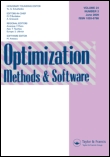
OPTIMIZATION METHODS & SOFTWARE
Scope & Guideline
Empowering Innovation in Applied Mathematics and Control
Introduction
Aims and Scopes
- Development of Optimization Algorithms:
The journal emphasizes the creation and refinement of optimization algorithms, including but not limited to gradient descent methods, interior-point methods, and heuristic approaches. This includes both theoretical analysis and practical implementations. - Application of Optimization Techniques:
Research published in the journal often highlights the application of optimization methods in diverse fields such as machine learning, operations research, and engineering, demonstrating the real-world relevance of theoretical advancements. - Stochastic and Robust Optimization:
A significant focus is placed on stochastic optimization and robust optimization techniques that address uncertainty in data and model parameters, ensuring solutions are viable under varying conditions. - Multi-objective and Bilevel Optimization:
The journal also covers multi-objective optimization and bilevel programming, which involve optimizing multiple conflicting objectives and hierarchical decision-making processes, respectively. - Integration of Optimization with Machine Learning:
There is a growing interest in the intersection of optimization and machine learning, particularly in developing algorithms that enhance learning processes or optimize machine learning models.
Trending and Emerging
- Data-driven and Machine Learning Optimization:
There is an increasing trend towards optimization methods that leverage data-driven approaches and machine learning techniques, highlighting the integration of these fields to enhance model training and decision-making processes. - Distributed and Parallel Optimization Algorithms:
Research on distributed and parallel optimization methods is on the rise, driven by the need for efficient computation in large-scale problems, particularly in the context of cloud computing and multi-agent systems. - Robust and Adaptive Optimization:
An emerging focus on robust and adaptive optimization techniques is evident, addressing the challenges posed by uncertainty and variability in data, which are critical for real-world applications. - Optimization in Networked Systems:
There is a growing interest in optimization problems related to networked systems, including applications in telecommunications, logistics, and transportation, emphasizing the importance of connectivity and resource allocation. - Non-convex and Nonsmooth Optimization:
Research exploring non-convex and nonsmooth optimization problems is gaining traction, reflecting a broader recognition of the complexities involved in real-world optimization scenarios.
Declining or Waning
- Traditional Linear Programming Techniques:
While still relevant, traditional linear programming techniques have seen a decrease in focus, as researchers are increasingly exploring more complex and adaptive methods tailored for modern applications. - Basic Gradient Descent Algorithms:
Basic gradient descent algorithms are less frequently discussed, with a noticeable shift towards more sophisticated variants that incorporate adaptive stepsizes and advanced convergence properties. - Static Optimization Problems:
Research on static optimization problems, which do not account for temporal dynamics, appears to be waning, as there is a growing emphasis on dynamic and time-sensitive optimization challenges. - Single-objective Optimization:
There is a noticeable decline in publications focused solely on single-objective optimization problems, possibly due to the increasing complexity of real-world problems that require multi-objective approaches. - Simple Heuristic Methods:
The prevalence of simple heuristic methods has diminished, as the field moves towards more robust and complex algorithms that promise better performance and adaptability.
Similar Journals
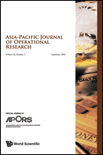
ASIA-PACIFIC JOURNAL OF OPERATIONAL RESEARCH
Advancing Operational Excellence in the Asia-Pacific RegionASIA-PACIFIC JOURNAL OF OPERATIONAL RESEARCH is a premier academic publication dedicated to the dynamic fields of operational research and management science, published by WORLD SCIENTIFIC PUBL CO PTE LTD. Located in Singapore, this journal has been pivotal in contributing to the dialogue and development of innovative strategies and methodologies within the operational research community since its inception in 1991. With a focus on practical applications and theoretical advancements, it serves as an essential resource for researchers, practitioners, and students seeking to enhance their understanding and expertise in decision sciences. The journal has gained recognition with a Q3 ranking in Management Science and Operations Research in the 2023 category quartiles, underlining its significance in the academic landscape. The Scopus ranking positions it reasonably well, attracting contributions that address both contemporary and emerging challenges in the field. Although the journal operates under a traditional publishing model, it offers vital access to a wealth of high-quality research, making it a go-to source for key findings and methodologies in operational research. Through its rigorous peer-review process, the journal aims to foster collaborative efforts that advance knowledge and practice across the Asia-Pacific region and beyond.
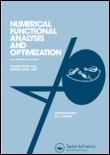
NUMERICAL FUNCTIONAL ANALYSIS AND OPTIMIZATION
Advancing mathematical frontiers through innovative analysis.NUMERICAL FUNCTIONAL ANALYSIS AND OPTIMIZATION, published by Taylor & Francis Inc, is a premier international journal dedicated to advancing the fields of analysis, optimization, and applied mathematics. With its ISSN 0163-0563 and E-ISSN 1532-2467, this journal has established itself as a vital resource for researchers and practitioners seeking to explore innovative methodologies and applications. Covering a broad spectrum of topics intersecting mathematical analysis and computer science, it has consistently ranked in the Q2 tier for Analysis and Control and Optimization categories and is well-regarded in the communities of Signal Processing and Computer Science Applications. The journal's commitment to publishing high-quality research ensures significant contributions to solving complex problems in various fields, making it an essential reference for students, academics, and industry professionals. With a publishing history dating back to 1979, it encourages the dissemination of groundbreaking ideas and practical methodologies, fostering a collaborative academic environment. Access to the published articles may vary, so contributors and readers are encouraged to engage with the latest findings and ongoing research through the journal’s platform.

JOURNAL OF OPTIMIZATION THEORY AND APPLICATIONS
Innovating Solutions for Real-World Optimization ChallengesJOURNAL OF OPTIMIZATION THEORY AND APPLICATIONS, published by Springer/Plenum Publishers, is a prestigious academic journal that has been at the forefront of the fields of applied mathematics, control and optimization, and management science since its inception in 1967. With an ISSN number of 0022-3239 and an E-ISSN of 1573-2878, it is recognized for its rigorous peer-reviewed content and aims to provide a platform for the dissemination of research that advances theoretical frameworks and practical applications in optimization. As of 2023, the journal holds an impressive Q1 ranking in both Applied Mathematics and Control and Optimization, showcasing its impact and influence in these domains. The journal is also highly ranked in the realm of management science and operations research, making it a vital resource for academics, professionals, and students alike. Though it does not currently offer open access, the journal's articles are widely accessible through institutional subscriptions. Significantly, its long-standing commitment to scholarly excellence positions it as a key player in fostering innovative research and discussions that impact various real-world challenges in optimization.

PROGRAMMING AND COMPUTER SOFTWARE
Exploring the Frontiers of Software Engineering ExcellencePROGRAMMING AND COMPUTER SOFTWARE is a distinguished journal committed to advancing the field of software development and programming methodologies. Published by PLEIADES PUBLISHING INC, this journal has been a valuable resource since its inception in 1978, reaching out to researchers, professionals, and students alike. With an emphasis on rigorous peer-reviewed articles, the journal holds a Q3 ranking in the realm of Software according to the latest 2023 Category Quartiles. Though it does not offer open access, the journal ensures that high-quality research is disseminated to its audience, providing insights into evolving programming techniques, software engineering challenges, and innovative solutions. With its convergence of years extending to 2024, PROGRAMMING AND COMPUTER SOFTWARE remains a pivotal publication, fostering a deeper understanding of the complexities in computer programming while supporting the broader software community.

Pacific Journal of Optimization
Navigating the Complexities of OptimizationPacific Journal of Optimization, published by YOKOHAMA PUBL, is a premier academic journal dedicated to the field of optimization, focusing on both theoretical developments and practical applications. With its ISSN 1348-9151, this journal provides a vital platform for researchers, professionals, and students to disseminate their innovative findings and to stay abreast of emerging trends in optimization. Although the journal’s coverage in Scopus was discontinued in 2012, it remains a significant resource for academics seeking to deepen their understanding of optimization methodologies across various disciplines. The journal promotes an enriching exchange of ideas, fostering advancements that are essential in the evolving landscape of operations research and decision-making processes. While it currently does not operate under an Open Access model, its content is pivotal for those aiming to contribute to and learn from cutting-edge research in optimization.
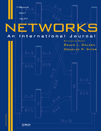
NETWORKS
Elevating Research in Networking ExcellenceNETWORKS, an esteemed journal published by Wiley, serves as a premier platform for the dissemination of high-quality research in the fields of computer networks, communications, hardware architecture, and information systems. With an ISSN of 0028-3045 and an E-ISSN of 1097-0037, the journal has been at the forefront of networking studies since its inception in 1971 and continues to thrive, boasting a convergence period that extends into 2024. Recognized for its rigorous peer-review process, NETWORKS is placed in the Q1 and Q2 quartiles of various categories, underscoring its significant impact and relevance in the realm of computer science. Although there is no open access option currently available, the journal remains a vital resource for researchers, professionals, and students who seek to navigate the evolving landscapes of technology and innovation. With its robust Scopus rankings and a growing readership, NETWORKS is dedicated to fostering advancements in network theory and practice, making it an essential read for those at the cutting edge of this dynamic field.

OPTIMIZATION AND ENGINEERING
Transforming Theories into Engineering BreakthroughsOPTIMIZATION AND ENGINEERING, published by SPRINGER, is a leading academic journal that has been at the forefront of cutting-edge research since its inception in 2005. Operating from the Netherlands, this journal serves as a key platform for disseminating innovative findings across multiple disciplines, including Aerospace Engineering, Civil and Structural Engineering, Control and Optimization, Electrical and Electronic Engineering, Mechanical Engineering, and Software. Notably, it has achieved a commendable Q2 ranking across various fields as of 2023, illustrating its growing influence and impact in the scientific community. The journal ranks impressively in Scopus, with control and optimization articles placed in the 79th percentile. The articles published cover a broad spectrum of optimization theories and their applications, appealing not only to seasoned researchers and professionals but also to emerging talents in the field. While it does not offer open access options, the availability through reputable institutions ensures that vital insights reach a wide audience. This makes OPTIMIZATION AND ENGINEERING an indispensable resource for anyone interested in the latest advancements and methodologies in optimization and engineering.

APPLIED MATHEMATICS AND OPTIMIZATION
Pioneering Applied Mathematics for Practical SolutionsApplied Mathematics and Optimization, published by Springer, is a prestigious journal dedicated to the rigorous exploration of applied mathematics, optimization techniques, and their multifaceted applications. Since its inception in 1974, the journal has maintained a robust reputation within the academic community, achieving a commendable Q1 ranking in both Applied Mathematics and Control and Optimization categories as of 2023. With an impact factor that underscores its influence in the field, the journal provides a platform for researchers and practitioners to disseminate innovative methodologies and significant advancements. While it does not offer Open Access, the journal’s esteemed peer-reviewed articles serve as invaluable resources for the advancement of theoretical knowledge and practical applications. Researchers, professionals, and students alike will find Applied Mathematics and Optimization an essential source for staying at the forefront of mathematical sciences, particularly in optimizing real-world systems and processes.
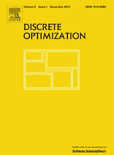
Discrete Optimization
Unlocking Solutions Through Discrete MethodologiesDiscrete Optimization is a leading academic journal published by Elsevier, focusing on the pivotal field of discrete optimization, which plays a crucial role in various domains including applied mathematics, computational theory, and theoretical computer science. With its ISSN 1572-5286 and E-ISSN 1873-636X, the journal offers a platform for researchers to disseminate their findings and contribute to the advancement of knowledge in discrete methodologies and algorithmic strategies. Discrete Optimization has demonstrated a steady path of progress, recognized in 2023 with a Q3 quartile ranking across applied mathematics, computational theory, and theoretical computer science categories, indicating it is a respected journal within these competitive fields. Although currently a subscription-based journal, it continues to inspire innovative research and offers valuable insights for researchers, professionals, and students alike. The journal serves as an essential resource for those seeking to deepen their understanding and application of optimization techniques, contributing to the ongoing evolution of the discipline.

JOURNAL OF COMPLEXITY
Unraveling the Threads of Mathematical ComplexityJOURNAL OF COMPLEXITY, published by Academic Press Inc. Elsevier Science, is a prestigious academic journal that has been at the forefront of advancements in the field of complexity science since its inception in 1985. With an ISSN of 0885-064X and an E-ISSN of 1090-2708, this journal is recognized for its impactful contributions across a range of mathematical disciplines, evidenced by its Q1 quartile rankings in Algebra and Number Theory, Applied Mathematics, Control and Optimization, Numerical Analysis, Statistics and Probability, and more. Positioned within the top echelons of Scopus rankings, it boasts notable standing—ranking #6 in Algebra and Number Theory and #25 in Numerical Analysis. Researchers, professionals, and students will find the journal's rigorously peer-reviewed articles invaluable for exploring the intricate relationships and phenomena that characterize complex systems. Although not an open-access journal, the insights offered are essential for expanding knowledge in mathematical frameworks and their applications in real-world problems. With a converged publication timeline extending to 2025, the journal is poised to continue shaping the discourse in complexity studies for years to come.